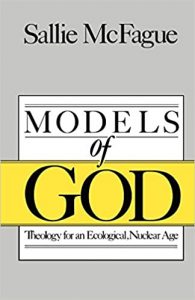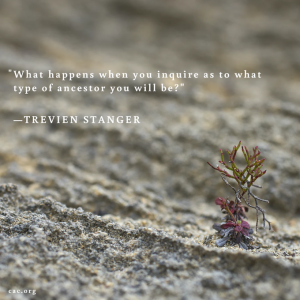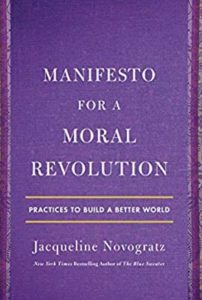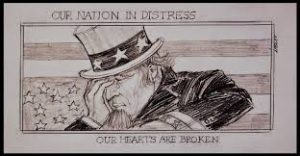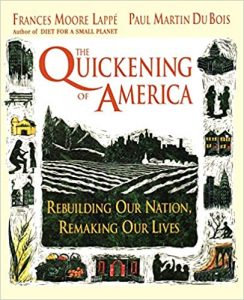Jacqueline Novogratz
What Happens When You Plant a Tree?
May 23, 2020For all its presumed innocence, this way of life lived by well-off North Americans is both unjust to those who cannot attain this lifestyle and destructive of the very planet that supports us all.
—Sallie McFague
Sallie McFague was an American feminist Christian theologian, best known for her analysis of how metaphor lies at the heart of how we may speak about God. She applied this approach in particular to ecological issues, writing extensively on care for the earth as if it were God’s “body.”
‘In this award-winning text, theologian Sallie McFague challenges Christians’ usual speech about God as a kind of monarch. She probes instead three other possible metaphors for God as mother, lover, and friend.’
Center for Action & Contemplation
While we may continue to practice physical distancing from other humans, most of us can still safely spend time in nature. The Journal of Health Psychology confirms what Franciscans and mystics have long known: interacting with nature is a great stress reliever. Just thirty minutes of gardening lowers the cortisol released during stress-induced fight-or-flight responses. Today’s practice, written by poet, writer, and educator Trevien Stanger for the book Order of the Sacred Earth, invites us to make a very specific contemplative contribution by planting trees.
Ethnobotanist, author, and Potawatami elder Robin Kimmerer asserts, “We need acts of restoration, not only for polluted waters and degraded lands, but also for our relationship to the world. We need to restore honor to the way we live, so that when we walk through the world we don’t have to avert our eyes with shame, so that we can hold our heads high and receive the respectful acknowledgment of the rest of [the] earth’s beings.” [1] . . .
I contend that every individual can participate in [the] Great Turning, and that one of the great challenges of our time is for each of us to figure out how and where we plug into this psycho-spiritual current. . . . I, for one, plant trees. . . . In my more recent work as an environmental studies professor at a community college in Vermont, I’ve had a hand in planting just shy of 100,000 trees over the past 12 years. . . .
What happens when you plant a tree? What happens when you wield a shovel in one hand (a human artifact) and a tree (a provisional mystery) in the other? What happens when you dig a hole (a Kali-like destruction) and plant a tree within it (an act of creativity)? What happens when you learn about your local ecology not just as an observer, but also as a participant? What happens when you embrace the wildness of a tree-being and integrate it into the semi-wild streets and streams of your local community? What happens when you crack open your isolated sense of self and plant within your heart this symbol of our ever-branching inter-being? What happens when you consider your actions in terms of your ecological and cultural legacy? What happens when you move beyond your concerns of today and inquire as to what type of ancestor you will be? Nelson Henderson posits that “. . . one true meaning of life is to plant trees under whose shade you do not expect to sit.” [2] Under whose shade do you sit beneath today? Whose shade shall you help gift for tomorrow?
[1] Robin Wall Kimmerer, Braiding Sweetgrass: Indigenous Wisdom, Scientific Knowledge, and the Teachings of Plants (Milkweed Editions: 2013), 195.
[2] Wes Henderson shared his father’s advice in Under Whose Shade: A Story of a Pioneer in the Swan River Valley of Manitoba (W. Henderson & Associates: 1986, ©1982).
Trevien Stanger, “Tree Planter,” Order of the Sacred Earth: An Intergenerational Vision of Love and Action, Matthew Fox, Skylar Wilson, and Jennifer Listug (Monkfish Book Publishing Company: 2018), 184-186.
Image credit: Legend of St. Francis: 15. Sermon to the Birds (fresco detail), artist unknown, formerly attributed to Giotto di Bondone, c. 1297–1299, Upper Basilica of San Francesco d′Assisi, Assisi, Italy.
Thoughts on Democracy & Gaia
May 22, 2020Gaia
From Father Richard Rohr, Barbara Holmes, and Bill McKibbon:
Goodness is a first principle of the universe. God declares it on the first page of the story of creation. —Barbara Holmes
Creation is the first Bible, as I (and others) like to say [1], and it existed for 13.7 billion years before the second Bible was written. Natural things like animals, plants, rocks, and clouds give glory to God just by being themselves, just what God created them to be. It is only we humans who have been given the free will to choose not to be what God created us to be. Surprisingly, the environmentalist and author Bill McKibben finds hope in this unique freedom. He writes:
The most curious of all . . . lives are the human ones, because we can destroy, but also because we can decide not to destroy. The turtle does what she does, and magnificently. She can’t not do it, though, any more than the beaver can decide to take a break from building dams or the bee from making honey. But if the bird’s special gift is flight, ours is the possibility of restraint.
We’re the only creature who can decide not to do something we’re capable of doing. That’s our superpower, even if we exercise it too rarely.
So, yes, we can wreck the Earth as we’ve known it, killing vast numbers of ourselves and wiping out entire swaths of other life—in fact . . . we’re doing that right now. But we can also not do that. . . .
We have the tools (nonviolence chief among them) to allow us to stand up to the powerful and the reckless, and we have the fundamental idea of human solidarity that we could take as our guide. . . .
While the lives of our elders, our vulnerable, and essential workers are at stake during the COVID-19 pandemic, tens of millions of us across the globe have been restraining ourselves at home, choosing not to do many things for many weeks in order to protect those we love (and those others love as well). Surely the earth is breathing a sigh of relief for our reduction in pollution and fossil fuel use. This “Great Pause,” as some are calling it, gives me hope that we will soon find it within ourselves to protect our shared home, not only for our own sake, but for our neighbors across the globe, and future generations.
Democracy
How is a huge part of the world organised under a system that has different meanings country-to-country, and could even mean something different to you, and the person standing behind you in the line to vote?
How do we know democracy is broken if we don’t know what it is?
by Patrick Chalmers.
“To my mind, there seems no better starting point for understanding politics than to grapple with the word “democracy”. What does it mean and how should it work?
The word is easy enough to define. It comes from the Greek for people (demos) and power (kratos), translating as people power, or government by the people. Most of us know democracy as something like that. But things quickly get more complicated when we ask what exactly that means in everyday life.
‘…there’s ubuntu, Watch South African Anglican cleric and human rights activist Desmond Mpilo Tutu describe ubuntu in this video clip.the Nguni language word for a humanist philosophy and way of living from southern Africa. It’s most often translated as “I am, because you are”, a profoundly political concept which evokes the connectedness that exists, or should exist, between all people and the planet – a manifesto for inclusive government.’
The distorting – if not corrupting – influence of money helps to explain why elected representatives rarely reflect the societies they are meant to represent but rather their richer members. Consider the representation of women in government. Though their share of seats in legislatures worldwide is growing, they still represent fewer than a quarter of deputies. The same goes for minorities – whatever they may be, wherever they may be. So while, for example, western countries are becoming more ethnically, racially and religiously diverse, their legislators generally haven’t kept pace with these changes. If the current US presidential race is anything to go by, the face of democracy is still pale, male and stale. In parts of the world where people of colour are the majority, male and stale usually covers it.”
Rilke:
As the arrow endures the bowstring’s tension so that, released, it travels farther. For there is nowhere to remain.
Alexandra Stoddard:
Concentrate on seeing all the beauty your soul can absorb but turn away from what is ugly and vile and degrading. The higher your sights, the better your spirits. Everything we do requires us to reveal our inner longings. Identify them clearly and make productive use of them.
Thomas Merton:
There is nothing more tragic in the modern world than the misuse of power and action to which men are driven by their own Faustian misunderstandings and misapprehensions. We have more power at our disposal today that we have ever had, and yet we are the more alienated and estranged from the inner ground of meaning and love than we have ever been. -Contemplation in a World of Action, 1965
A Democratic Pledge
I would like to
- become more selective in what I watch and read
- become more critically aware of the messages I receive
- find new sources information about the things I care about most
- participate in local media
- create interactions in my community
Living Democracy is emerging within the human services, focusing not solely on individual self-reliance but also on the capacities of people to work together for mutual healing and problem solving. Society’s obligation to help support citizens with specific needs does not have to mean top-down governmental control; self-help and society’s help are mutually enhancing and mutually beneficial.
Listen.
Jacqueline Novogratz
Towards a Moral Revolution
Moral reckonings are being driven to the surface of our life together: What are politics for? What is an economy for? Jacqueline Novogratz says the simplistic ways we take up such questions — if we take them up at all — is inadequate. Novogratz is an innovator in creative, human-centered capitalism. She has described her recent book, Manifesto for a Moral Revolution, as a love letter to the next generation.
‘I think, in this moment of such peril & possibility, we really could build a world like the world has never seen before. If there was ever a decade to do it, it’s this decade. I want future generations to say, “Look how hard they tried,” not “Look at how blind they were.”’
